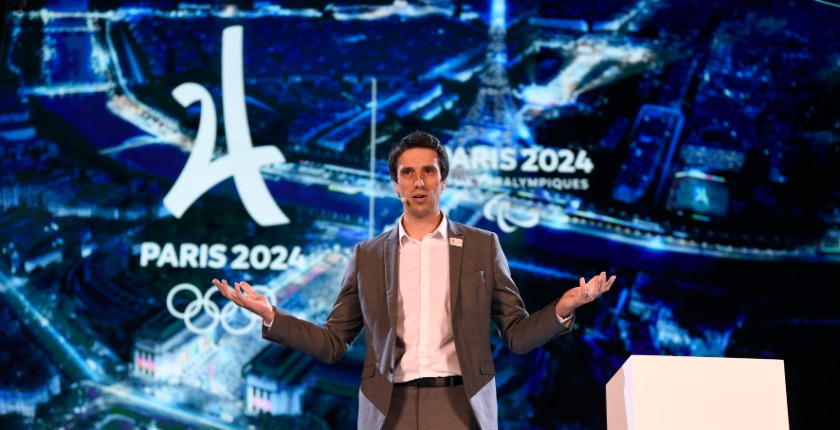Interviews - June 7, 2019
Paris 2024, "the most sustainable games of all time"?


Written by Tristan Lebleu 3 min read
Interview with Tony Estanguet, President of the Organising Committee of the Paris 2024 Olympic Games
This article is a translation of interview in french. Read the original here.
Events such as the Olympic games, the FIFA World Cup or the Champions League fly-in millions of spectators, as well as thousands of athletes and staff, which implies a significant carbon footprint. Organising them sustainably has become a challenge and a priority. The Paris 2024 Olympic and Paralympic Games aim to turn this challenge into a commitment: to become the most sustainable Games of all time.
We interviewed Tony Estanguet, President of the Paris 2024 Olympic Games organising committee and asked him about it.
 Champs Elysées ©Paris 2024-Luxigon
Champs Elysées ©Paris 2024-Luxigon1/ Paris 2024 made a bold statement: to become the "most sustainable Games of all time". Can you tell us your strategy to achieve this objective?
With Paris 2024, we have placed environmental ambition at the heart of our project. We want to rethink the way the Games are organised through a 360-degree approach throughout the entire cycle of preparation and organisation of the Games.
This is reflected first of all in the choice to use 95% of existing or temporary infrastructure. When other editions built up to 10 new sports facilities, we will only build one, the Aquatic Centre, designed primarily for the needs of the Seine Saint-Denis, where 1 in 2 children cannot swim. As for the Olympic Village, it is designed as a sustainable eco-neighbourhood for the local inhabitants. Athletes will only be the first tenants.
During the Games, it is our responsibility to be exemplary. Spectator tickets will be paired with a public transit ticket to encourage the use of public transport. We will use 100% renewable energy for the organisation of the Games, clean transport for delegation travel, and we will provide sustainable food for the Olympic and Paralympic family and spectators, to name just a few examples of the actions we are working on now.
 Village Olympique ©Paris 2024-Luxigon
Village Olympique ©Paris 2024-Luxigon2/ Do you think that Paris 2024 can go as far as to achieve carbon neutrality?
This is ambitious and it is our goal.
By their very concept, the Paris 2024 Games will emit half as many greenhouse gas emissions as the last editions of the Olympic and Paralympic Summer Games.
The next step is to reduce our footprint as much as possible by integrating, in each decision making, the assessment of our carbon impact. The innovations and all the new solutions that companies can offer us will be key to helping us achieve this.
And for all the emissions that we cannot avoid, such as the transport of spectators, they will be compensated.
3/ Beyond minimising its environmental impact, how can Paris 2024 - and major sporting events in general - contribute to promoting sustainable development?
The Olympic and Paralympic Games are the largest event in the world, bringing together 206 delegations around shared values: the Games have a unique universal dimension. It is also the most high-profile event in the world with 4 billion viewers. In this sense, it is an extraordinary showcase and platform to share our project with the whole world and defend our values.
Even beyond the Games, we believe in the unique power of sport to mobilise and unite. Whether during events or in everyday practice, sport can be a great vehicle for better habits for oneself and the environment. This is why, by 2024, we will carry out educational actions with the general public and in particular with Games spectators to promote soft mobility, waste reduction, sustainable food... The Games must be exemplary, and everyone, at their level, has a role to play.
4/ Major sporting events are sometimes criticised. What do you say to those who think that at a time when humanity is facing a major climate crisis, sporting events like Paris 2024 are inappropriate?
From the bid phase we involved many stakeholders in defining our environmental strategy: the sports movement, experts, environmental associations, including WWF, which supported us in building this project. The objective is to extend this dynamic to make the model evolve.
This is the challenge: to overcome the opposition of principles and build a new model in line with environmental issues. Faced with environmental challenges, sporting events must not only take their share of responsibility by limiting their impact, they must also go further by putting the emotion and values of sport at the service of behavioural change. And it is collectively that we will achieve this.
This awareness is reflected at the highest level in the International Olympic Committee's Agenda 2020, of which Paris 2024 will be the first edition to implement the new model. We are also associated with the UNFCCC's Sports for Climate Action initiative to encourage the world of sport to reduce its greenhouse gas emissions related to the organisation of sports competitions.
Did you like this article? You may be interested in the following article:
Faster, Higher, Stronger.... Greener?
How sports events are joining the sustainability challenge
Do you have a solution against the carbon footprint of major events?
Submit your solution to obtain the "Solar Impulse Efficient Solution" label.

Written by Tristan Lebleu on June 7, 2019
